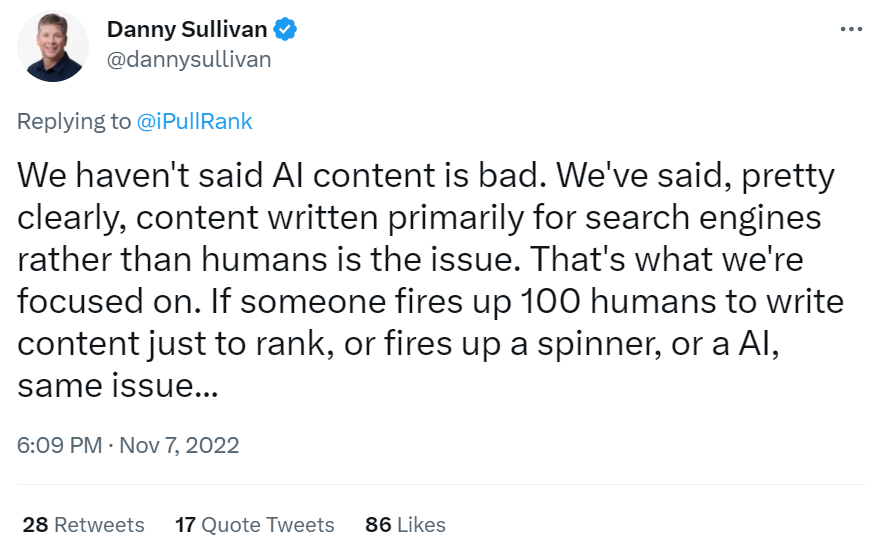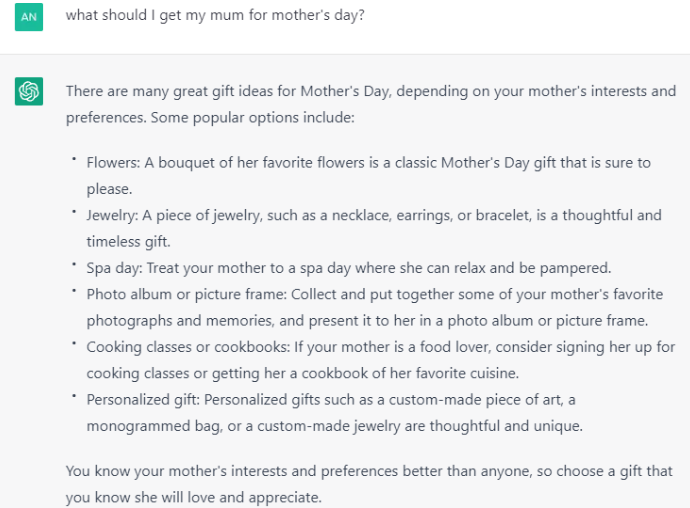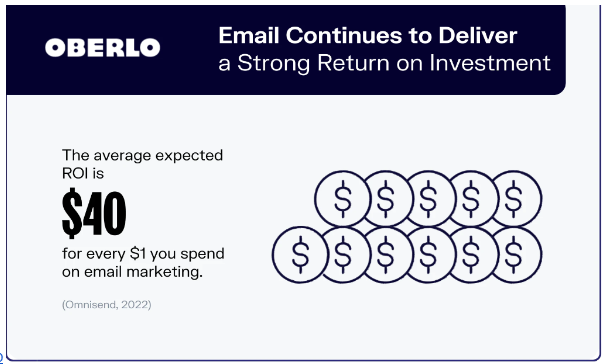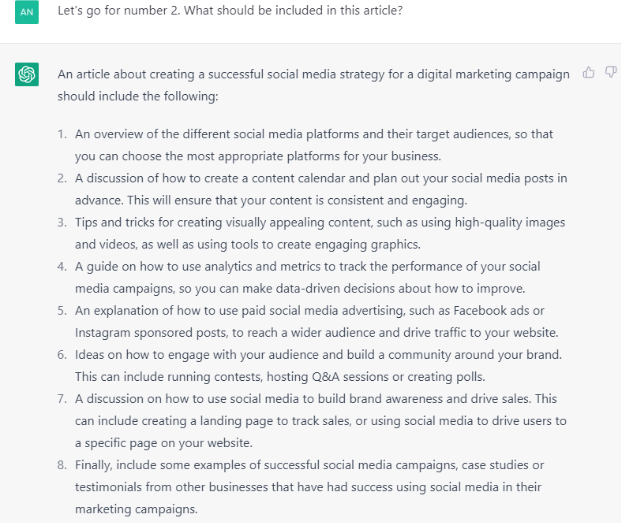Unless you’ve been living under a rock or managed to completely avoid LinkedIn, Twitter, etc for the past couple of months, you’ll be all too familiar with AI’s Next Big Thing - the ubiquitous ChatGPT. It creates poems! It writes code! It tells you how to fix a knackered washing machine! It also serves as another incredibly useful AI tool for marketers to enhance their digital marketing campaigns.
In this article, I’ll explore how marketers are currently reaping the benefits of AI tools available on the market today, and explore examples of how these tools can benefit your digital marketing campaigns this year and beyond.
Hang on - isn’t AI generated content a bad thing?
Yes and no. Firstly, Google’s not a huge fan, with the platform continuously rolling out algorithm updates to prioritise unique, human-written content on its SERPs. That’s not to say AI content is always subpar, but as a general rule, Google would rather its users were presented with content that shows a degree of expertise and originality - which is fair enough really.

It’s certainly true that AI content can never truly replicate brand tone of voice, or the creativity and insight of human-created content, but what it *can* be incredibly useful for, is undertaking research, or for providing inspiration to support blog or article creation. Anyway, more on that later.
How are marketers currently using AI?
AI isn’t just about creating inspiration for content. When it comes to the likes of marketing automation, AI is a godsend - and not just for email campaigns. A 2022 Statista survey of global marketers revealed how AI is deployed across a multitude of functions:

If you’ve any experience of Google Ads, then you’ll know all too well how useful AI can be (well, sometimes!), not only to serve your ads, but also to create them in the first place.
Google’s new ‘Performance Max’ campaigns are now the bedrock of Google Ads, yet if you ask anyone to explain how they work, it’ll very much be a case of ‘Computer says yes’. In the world of travel, a range of companies have been pioneering AI technology and machine learning to help predict user intent and increase conversions for many years. Ultimately, AI is touching a lot of our marketing working week at increasing speed across many areas.
So how can AI improve your digital marketing campaign in 2023 and beyond? Five ideas from us…
Below are 5 examples of how AI can be your right hand man when it comes to your digital marketing strategy.
1. Real time customer engagement
Marketing teams can leverage AI-driven chatbots to interact with customers in real-time. These chatbots can usually be integrated into a company's website or social media channels to provide instant replies to customer inquiries and provide personalised suggestions based on their previous interactions with the brand. And as AI chatbots continue to develop, the scope for marketing support they could potentially offer continues to grow. We are already seeing chatbots that can troubleshoot increasingly difficult technical issues, collect and analyse customer data more effectively and support multiple languages, making it easier for businesses to engage with a diverse customer base. The tone of language is evolving too, with a more human, empathetic tone.

2. Create your own unique images (and save time!)
Fed up with trawling through the usual stock image sites for that one perfect photo that doesn’t *quite* capture what you’re after? Don’t want to spend money on your own marketing photoshoot? Using AI Art generators such as Jasper Art, Starry or DALL:E 2 might just be the solution as they can quickly generate unique, customised images suitable for a variety of marketing materials. If you’re a marketer for a dating site, for example, you might have an idea in your head for that perfect image to use as a banner on your landing page. Now you can type in a description of the kind of visuals you have in your head and - boom - AI will usually create an image close to what you envisaged.

That’s not to say these tools always come up with the goods. There’s room for improvement, but as the technology continues to evolve, examples like below will hopefully become less frequent:

3. Analysing customer behaviour
Understanding what your customers want and need — preferably even before they do — is the never-ending Holy Grail for marketers. Artificial intelligence methods such as deep learning (a subset of machine learning) can help analyse customer buying behaviour by using machine learning algorithms to process and analyse large amounts of data. This data can include customer demographics, purchase history, browsing behaviour and various other customer interactions, which AI can then use to identify patterns and trends.
Additionally, AI can also be used to predict future buying behaviour, allowing businesses to proactively target potential customers and anticipate changes in the market. Furthermore, it can also help to automate and optimise pricing strategies, by analysing data on customer behaviour, competitors and market conditions, in order to maximise revenue and profitability. The cost and set up overhead of these tools continues to decrease each year and many companies are now using these data sets to set budgets, plans, actions and many other things for the year ahead. It goes without saying that recent years have been hard to use to base forward projections from, but if the world does return to some sort of normal, the power of these tools will only increase.
4. Revolutionising email marketing campaigns
Email marketing is a big business. According to Stastista, email marketing revenue is estimated to reach almost $11billion by the end of this year, and with the ROI average at $40 for every $1 spent on email marketing, it comes as no great surprise that it plays a key role in many brands’ marketing strategies. Whether that ROI number is on the high side or not (we’d say so, and is obviously skewed as you're marketing to a more receptive audience, but anyway...), certainly email marketing combined with AI can be a very powerful combination.

But setting up emails and knowing the right time to send them, can be time-consuming and laborious, which is why using AI email generator tools such as Mailmodo and Copy.ai can help. Not only can they personalise email copy and make product recommendations, they can also analyse large sets of data and extract actionable patterns to optimise sending frequency, design winning campaigns, and prevent subscribers being bombarded with generic emails.
They’re pretty nifty for segmentation too. Segmenting an email list manually can be a tedious task and susceptible to human error. AI can automatically categorise email lists based on data gathered from existing clients, such as purchase history, browsing behaviour, and preferences and then use this information to create segments and send personalised emails to each group. This eliminates the need to make assumptions about which products will appeal to a particular customer or what type of content they will enjoy reading.
5. Inspiration for great content
We know from E-E-A-T guidance that the content Google wants to see on its results pages should be original and created by a trustworthy source with considerable experience of the product, service or information it is promoting. This doesn’t bode well for AI-heavy content, but that’s not to say it can’t be an incredibly valuable tool for marketers and content creators. If, for example, you’re trying to find inspiration for a blog or article, rather than staring at a blank page, tools such as ChatGPT can give you a gentle push in the right direction. Let’s look at an example:

These are all strong, relevant titles. If we wanted to go for, say, the second option here, ChatGPT can also help with suggestions for the structure and type of content that could be included.

Perfect if you’re suffering from Writer’s Block. What’s important to remember is that AI tools like ChatGPT are not ideal for creating final draft copy. Yes, they are great to support your research and help out with topic suggestions, but long-form AI content can be repetitive, lacks a human tone and is not always 100% reliable. And remember that your target audience wants to hear from you, not a robot.
What does the future hold for AI in digital marketing?
The future is very bright for AI in all forms of marketing, not just digital. It's already being used in many places and impacting your digital marketing efforts, it's just not THAT noticeable yet. Certainly Google, Facebook and others have been using AI for their marketing platforms for many years, and as they start to 'optimise' more and more on our behalf, we start to have less and less control.
But the good news is that some of the AI tools available now can really have a real impact and help marketers be more efficient & better at their jobs. Some of the tools mentioned save time, give more (or sometimes better!) ideas and help to create better output from our efforts.
But let's be clear - just because it's AI, it's not going to solve all of your problems. Like any machine or piece of software, it can only works from the commands or prompts that we give it. Bad idea or data in, bad ideas or data out. To really get the best from these AI tools, you need to be patient, learn over time and check the outputs for quality and credibility, in the same way you should with any piece of work. Only then will AI be a help rather than a hinderance.
Right, I'm off to get AI to make me a coffee. Damn it. There is still work to be done.




